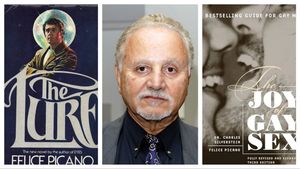Since Tom Ford is Out's Artist of the Year, he should be taken seriously as an artist. His new film--his second following A Single Man--is Nocturnal Animals, a title that essentializes human beings to their bodily essence and desperate habits. The lead characters, Los Angeles gallerist Susan (Amy Adams) and Texas novelist Edward (Jake Gyllenhaal), are not the mannequins you would expect from a fashion designer turned film director. As that title suggests, both are nightmare figures: We see her fears and his threat. The movie is about a phenomenon of the Internet age: revenge porn.
Susan left Edward after what Johnny Rotten called "a fucking bloody mess" and has married a distant careerist (played by Armie Hammer). While suffering an artist's and a neglected wife's insecurities, Susan receives galleys of her ex's new novel also titled Nocturnal Animals. As she reads the tome and imagines its story, Ford intercuts flashbacks of their past relationship. The two narratives are stylistically varied artifices--as if Ford had placed a mink stole over a tuxedo. Edward's gift is, actually, a vicious gesture of reprisal which Susan's own fervid imagination turns into an amplification of her specifically feminine torment and regret.
Just as fashion covers the body's impulses and reflexes, Ford combines romantic heartache with slaughter-movie gore (the film's one joke--Susan mistaking a woman's plastic surgery--could be Tarantino gone bitchy). Because Ford deals in sex and sensuality, the grindhouse plot is most revealing of our culture's sexualized decay. In the novel, Edward's alter-ego hunts for the thugs who raped and killed his wife and teenage daughter--extreme acts of gynophobic aggression. The lead scoundrel, Ray Marcus, is portrayed by Aaron Taylor-Johnson who, in his big scene, sits on an outdoor commode with his pants around his ankles--crapping but exhibiting his torso. "Those lips, those eyes/Those hips, those thighs." Taylor-Johnson is a good actor (as proved when he played John Lennon in Nowhere Boy) but, visually, is he also a work of art. Ford knows it, displaying him as a down-and-dirty sexual object, a low-class, redneck stud whose intrusion on Susan's bourgeois imagination gets vanquished, yet can never be totally eradicated like the return-of-the-repressed fantasies in all horror movies.
But Nocturnal Animals is also an unabashed art thing. Ford's opening credit sequence makes a Damien Hirst-style dare--a series of repugnant gifs of obese women jiggling before a red backdrop. These shots evoke Lucien Freud and David Lynch nudes; folds of fat, flesh wounds and operation scars undulate provocatively, expressing an ultimate revulsion of the female form. Ford's very serious point must be that the art world (like the fashion world?) is often centered on patterns of exploitation and contempt. His film's concept uncovers the current cultural trend toward punishment and revenge (Susan's gallery features a wall-sized painting of the word "REVENGE").
When Susan reads of a psycho cop (played by Michael Shannon at his most Frankensteinian) discovering the dead wife and daughter, Ford features the crime scene as an art scene -slaughtered nudes on a red couch with a crucifix around the neck of one female corpse.
I'll wager that Nocturnal Animals reveals Ford's fascination, guilt and distaste in response to what he's experienced as a celebrity and artist. A hoity-toity woman advises Susan, "Enjoy the absurdity of our lives," referring to her own arrangement with a gay art-world husband (Michael Sheen), a fashion-beard who tells Susan "Nobody likes what they do. We're driven." Susan also listens to a friend describe a man's ejaculate "He came thin as coconut water." Ford's filmmaking isn't campy, it's out-front if not outright expressionist. Nocturnal Animals is a revenge drama by a designer who deals in beauty then reveals his society's ugliness.
Nocturnal Animals is now playing in select theaters.
























































































